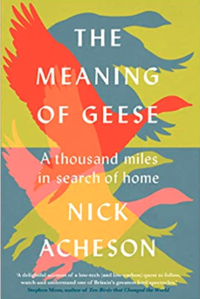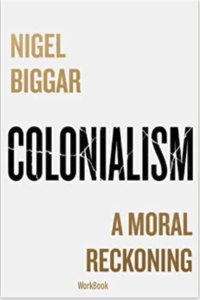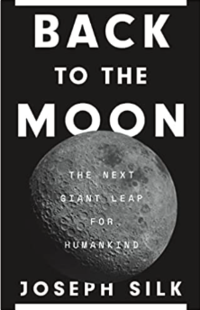OFF THE SHELF: FEBRUARY 2023

OFF THE SHELF: FEBRUARY 2023
This month a meditation on geese, a gritty crime thriller set in Oxford, and appraisals of the moon and empire
Published: 1 February 2023
Author: Richard Lofthouse
Share this article

The Meaning of Geese by Nick Acheson (Chelsea Green, £20) is published on 9 February
Nick (Oriel, 1996) is an alumnus of Oxford’s Environmental Change Institute, the ECI, which is to be found within the School of Geography. In recent years he had a big change of heart and gave up international travel despite having previously been focused on conservation and showing tourists nature in far flung places. COVID and climate change ended all that, plus a reawakening of his attachment to place, in this case the place of his upbringing, Norfolk. Faced with lockdown he began to keep a journal detailing the migration of geese. The resulting book is fantastic and heartfelt and not surprisingly sounds the alarm for the way climate change may affect the annual migration of the geese. But the geese are the real stars, the excitable pinkfeet, the brents and the barnacles. The presence of the geese put him back into the landscape, right-sized rather than over-important, and he likes it. ‘The smaller I can feel, the better it is. And that’s not a self-obliterating feeling, it’s a feeling of wanting to know my place, because genetically, the carbon, the genes, everything that makes me and you and us is part of this enormous flow, and these geese are a sacrament of that.’
*Nick is also speaking at the Oxford Literary Festival on Saturday 25 March.

The Broken Afternoon by Simon Mason (Riverrun, £16.99) is published on 2 February
Currently a Royal Literary Fund Fellow at Exeter College, Oxford, Simon specialises in crime fiction, but previous for a young adult audience. Now he steps into the limelight with the first novel in the DI Ryan Wilkins Mystery series, and naturally it’s set in Oxford. The book has been widely praised, even dubbed ‘Inspector Morse for the 2020s’. We couldn’t possibly comment, but it certainly updates the language to include normal swearing and words like ‘freaked’ and ‘popped’. It’s tight and it’s fast, the plot revolving around a search for a missing four-year-old girl and the ratcheting tension between a maverick cop kicked out of the force – DI Ryan Wilkins – and DI Ray Wilkins his former colleague who’s the insider who can’t make much progress due to red tape. Ryan is a bit more rogue in his methods and that gives Mason the opportunity to whip up some action. The plot has a carefully studied sense of place, not just within the city but out to Marston and out again to Elsfield, that marvellous hamlet. If you know Oxford you won’t quibble. The leads become explosive because they lead back up to the top. Very much a theme for 2023 then, surrounded as we are by police scandal and political scandal and a general collapse in the standards of public life.

Colonialism: A Moral Reckoning by Nigel Biggar, (William Collins, £25)
Nigel Biggar is Oxford’s emeritus regius professor of moral and pastoral theology, and in this book he attempts to draw up a moral balance sheet of empire. It is a very important book and has also courted controversy by confronting critics of empire who have essentially said that the whole enterprise was immoral or even genocidal. The trouble with that, Biggar says at the very start, is that it assumes a monolithic project which the British empire simply was not. ‘No one woke up one sunny morning in London and said, ‘Let’s go and conquer the world.’’ The closest we might get to a single vision empire that was genocidal is Hitler’s Third Reich, Biggar offers by contrast. But in no way can you stage that argument about the British empire which was a compilation of acquisitions and conquests across centuries. In some ways it was tangled up in a Protestant valuation of anti-authoritarianism, argues Biggar, and in other ways the outworking of European rivalries. More often than not it was the outworking of both at once. The main rival was Spain in the 16th century; later it was France, then it was Russia, later still it became Germany. After 1707 there were more complexities as individuals from – say – Scotland escaped their poverty to a life of adventure, and the Scots were prominent in the life of the British Empire once it became ‘British’ as opposed to merely English. Then, yes, consider the nobility of a powerful nonconformist class who came to view slavery as evil, backlit by the strongest personal conscience allied to private faith. It would be wholly unreasonable, argues Biggar, to default the currently fashionable view that empire was no more than ‘domination, despotism, oppression, racism, white supremacism, exploitation, theft or unconstrained violence.’ Certainly there were elements of these categories, particularly at certain moments. The author does not seek to white wash the imperial project.
Controversy is good and this book is carefully wrought. Read it and decide for yourself. If there is one counter view that jangles a different set of bells, it might be over at St Edmund Hall where history lecturer Pratinav Anil simply points out that if you follow the money it tells a truer story of empire and also generates a narrative that is strangely defanged as regards the current culture wars. Instead of getting hung up over morals, argues Anil, we should ask why it was the sum spent on suppressing slavery was 1/400th the amount that British export trade with empire was worth. But Biggar’s book is bigger, in terms of the impact it will have in 2023.

Back to the Moon: The Next Giant Leap for Humankind by Joseph Silk (Princeton University Press, £25)
No one can dispute that there is now a space race with multiple participants. Part of that is to Mars but much of it is a more concrete, nearer-to-earth plan to colonize the moon, dig up minerals, put humans there on a more permanent basis and maybe ‘see’ much further into space by looking out from the moon’s poles, rather than from our own. The author is a Professor at Johns Hopkins University but also has a research position in Oxford’s Beecroft Institute for Particle Astrophysics and Cosmology. His book is going to hit a wide public audience and is in part mind-boggling, the last chapter imagining a significant permanent human population on the moon and conveniently reminding us that climate change won’t apply ‘because there is no lunar atmosphere to drive the greenhouse effect that feeds on terrestrial carbon production.’ It’s hard to gauge how realistic the book’s vision is but it’s impossible not to be caught up in the fizzing scientific curiosity that drives the book’s narrative, which ranges from practicalities like the composition of lunar dust to the ultimate question: will moon colonisation help us to answer that older question, whether there is other intelligent life out there?
Off the Shelf typically concerns books where there is an Oxford connection, whether the place, the University or of course the author.
Alumni can claim 15% discount in any Blackwell's store with a My Oxford Card.
Alumni can claim 20% discount at Oxford University Press.
Join the Oxford Alumni Book Club at: www.alumni.ox.ac.uk/book-club















